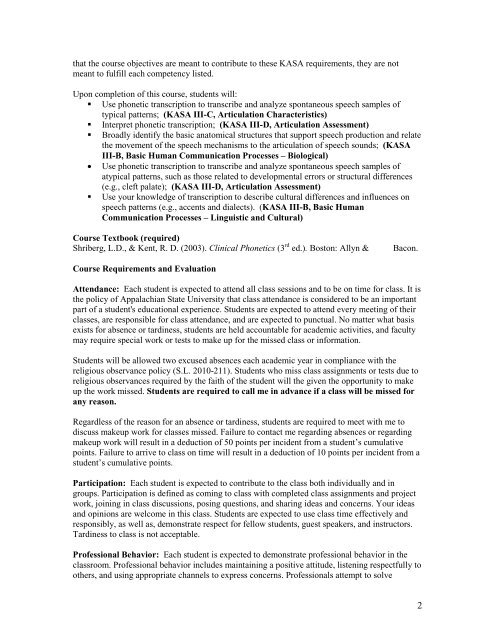CSD 2361 - Communication Sciences and Disorders - Appalachian ...
CSD 2361 - Communication Sciences and Disorders - Appalachian ...
CSD 2361 - Communication Sciences and Disorders - Appalachian ...
Create successful ePaper yourself
Turn your PDF publications into a flip-book with our unique Google optimized e-Paper software.
that the course objectives are meant to contribute to these KASA requirements, they are not<br />
meant to fulfill each competency listed.<br />
Upon completion of this course, students will:<br />
• Use phonetic transcription to transcribe <strong>and</strong> analyze spontaneous speech samples of<br />
typical patterns; (KASA III-C, Articulation Characteristics)<br />
• Interpret phonetic transcription; (KASA III-D, Articulation Assessment)<br />
• Broadly identify the basic anatomical structures that support speech production <strong>and</strong> relate<br />
the movement of the speech mechanisms to the articulation of speech sounds; (KASA<br />
III-B, Basic Human <strong>Communication</strong> Processes – Biological)<br />
• Use phonetic transcription to transcribe <strong>and</strong> analyze spontaneous speech samples of<br />
atypical patterns, such as those related to developmental errors or structural differences<br />
(e.g., cleft palate); (KASA III-D, Articulation Assessment)<br />
• Use your knowledge of transcription to describe cultural differences <strong>and</strong> influences on<br />
speech patterns (e.g., accents <strong>and</strong> dialects). (KASA III-B, Basic Human<br />
<strong>Communication</strong> Processes – Linguistic <strong>and</strong> Cultural)<br />
Course Textbook (required)<br />
Shriberg, L.D., & Kent, R. D. (2003). Clinical Phonetics (3 rd ed.). Boston: Allyn &<br />
Bacon.<br />
Course Requirements <strong>and</strong> Evaluation<br />
Attendance: Each student is expected to attend all class sessions <strong>and</strong> to be on time for class. It is<br />
the policy of <strong>Appalachian</strong> State University that class attendance is considered to be an important<br />
part of a student's educational experience. Students are expected to attend every meeting of their<br />
classes, are responsible for class attendance, <strong>and</strong> are expected to punctual. No matter what basis<br />
exists for absence or tardiness, students are held accountable for academic activities, <strong>and</strong> faculty<br />
may require special work or tests to make up for the missed class or information.<br />
Students will be allowed two excused absences each academic year in compliance with the<br />
religious observance policy (S.L. 2010-211). Students who miss class assignments or tests due to<br />
religious observances required by the faith of the student will the given the opportunity to make<br />
up the work missed. Students are required to call me in advance if a class will be missed for<br />
any reason.<br />
Regardless of the reason for an absence or tardiness, students are required to meet with me to<br />
discuss makeup work for classes missed. Failure to contact me regarding absences or regarding<br />
makeup work will result in a deduction of 50 points per incident from a student’s cumulative<br />
points. Failure to arrive to class on time will result in a deduction of 10 points per incident from a<br />
student’s cumulative points.<br />
Participation: Each student is expected to contribute to the class both individually <strong>and</strong> in<br />
groups. Participation is defined as coming to class with completed class assignments <strong>and</strong> project<br />
work, joining in class discussions, posing questions, <strong>and</strong> sharing ideas <strong>and</strong> concerns. Your ideas<br />
<strong>and</strong> opinions are welcome in this class. Students are expected to use class time effectively <strong>and</strong><br />
responsibly, as well as, demonstrate respect for fellow students, guest speakers, <strong>and</strong> instructors.<br />
Tardiness to class is not acceptable.<br />
Professional Behavior: Each student is expected to demonstrate professional behavior in the<br />
classroom. Professional behavior includes maintaining a positive attitude, listening respectfully to<br />
others, <strong>and</strong> using appropriate channels to express concerns. Professionals attempt to solve<br />
2


